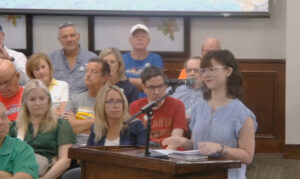The first stormwater utility bills for unincorporated Fayette County are set to be mailed this week. So what is the reason for the new stormwater utility for the unincorporated areas and how much it is going to cost?
Fayette County Stormwater Management Director Vanessa Birrell said stormwater bills for the unincorporated areas for January are based on the amount of square footage developed on each parcel. That impervious surface includes homes and other buildings as well as improvements such as driveways, sidewalks, decks and patios.
The stormwater fee will be 35 cents per 1,000 square feet of impervious space per month. So with an average of 6,400 square feet of impervious space per parcel in unincorporated Fayette, the annual bill will be $26.88. Birrell said the rate for the unincorporated areas is one of the lowest in the state.
It is of note, said Birrell, that there are a number of credits available that could offset the amount of the stormwater fee. The credit structure can be found in the Stormwater Management section of the county’s website at www.fayettecountyga.gov/stormwater_management/index.htm.
Birrell said the Stormwater Credit Manual outlines all the credits available and the credit application procedure.
“Large lot credits will be automatically processed and indicated on the new bill. Credits are also given for septic tank maintenance, rain barrel use, etc. Parcels located outside of watersheds containing drinking-water intakes are eligible for a no-impact credit,” she said.
So why does unincorporated Fayette need a stormwater utility program? The answer: an aging infrastructure and compliance with state and federal government requirements.
Birrell noted that Fayette County has reached the time when some of the early stormwater structures installed throughout the community are decades old and now need replacement.
“Basic replacement, operation, and maintenance costs for stormwater structures are rising every year as the county ages, and new federal requirements will further increase these costs,” Birrell said.
“The expense to the county related to stormwater management comes from having to repair or replace drainage structures that were initially installed by developers who built streets and roads which later became county-owned and maintained once homes and businesses were built and sold. It always becomes the responsibility of the local government to maintain roads, bridges and stormwater structures within its jurisdiction once development is complete and those assets become public property. Also, failure to adequately maintain drainage structures under or near roadways and public rights-of-way can cause them to deteriorate and possibly become unsafe,” Birrell said.
An inventory of Fayette’s stormwater system infrastructure completed in mid-November showed that 444 of the 3,304, or 13 percent, of above ground structures are in poor condition. The inventory also showed that 306 of the 2,025 stormwater pipes, or 15 percent, are in poor condition and, of those, 203 are clogged.
One of the first projects funded by the new utility is the Future Floodplain Mapping of the unincorporated county. All communities within the 15-county Metropolitan North Georgia Planning District are required to perform the mapping project. Stormwater fees will also cover mandated inspections of the infrastructure throughout the county to determine condition and prioritize maintenance as well as enforcement of water quality protection ordinances.
Birrell said that until recently the county has been managing stormwater runoff without much problem.
“It is important to understand that if not managed properly, the county’s most valuable natural resource, its streams and watersheds, will be negatively impacted as a result of past and future urbanization congruent with poorly-maintained, degraded and un-repaired stormwater systems. The stormwater function is no longer a basic capital construction and maintenance program, but a program providing integrated water-resource management, environmental enhancement and recreation services requiring a multi-faceted benefit based funding mechanism,” she said.
Birrell’s point is that, due to federal requirements through the federal Clean Water Act and the state-required Watershed Management Plan, stormwater management for communities with a population such as that found in unincorporated Fayette County is not an option. Failure to comply invites penalties from both the state and federal governments. The requirement is to implement protocols such as an asset management program for stormwater structures, Birrell said.
“The asset management program requirements jurisdictions to ‘inventory’ its existing drainage systems, assess their conditions and develop a maintenance plan to keep these structures in good working order,” said Birrell. “Fayette County meets this requirement by inspecting systems not previously inventoried every year. By complying with this requirement, the county has in fact discovered drainage systems that are in poor condition and are either in need of extensive maintenance to extend their life or, in some cases, need to be replaced entirely.”
Adopted by the Fayette County Commission in September, the Stormwater Utility Ordinance takes effect Jan. 1.
Both Fayetteville and Peachtree City operate stormwater utility programs with fees charged to property owners within those jurisdictions.











Leave a Comment
You must be logged in to post a comment.